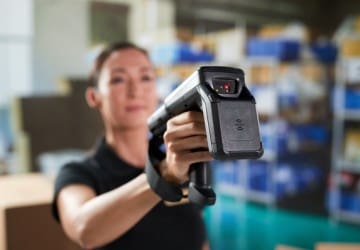The Risk of RFID Investment Can Be Managed with Proper Testing
RFID technology can be a game-changer for businesses because of its potential for high-speed passive capture of tag data, which can be used to count inventory, track high-value assets or people, and monitor or locate the positions of specific items. However, RFID technology implementation costs can be significant for a business, both in terms of time and resources.
Unlike traditional data capture methods like barcodes, RFID (Radio Frequency Identification) requires tags to be readable by RFID readers, which can pose challenges in real-world environments. Thus, before committing to a full-scale implementation, it’s essential to thoroughly assess the technology’s suitability for your specific needs. One cost-effective way to do this is by conducting an RFID pilot project with a minimal amount of RFID hardware. CSSI can help you design and test your RFID solution.
Test RFID To Assess Tag Readability and Reliability
One of the primary challenges in RFID implementation is ensuring that RFID labels (referred to as ‘tags) are readable consistently and reliably in various conditions. This is a primary difference with barcode technology, where barcode readability can largely be assured as long as labels are within line-of-sight of the scanner at a reasonable distance.
RFID readability is harder to predict. Factors such as interference from other electronic devices, signal attenuation due to materials, and RFID tag orientation relative to the position of RFID antennas can all impact the effectiveness of the RFID system.

Why Conduct an RFID Pilot Project?
Conducting a pilot project allows your business to test RFID tags and readers in your actual operational environment, identifying potential issues and refining the system accordingly.
Pilot projects serve as a low-risk way to evaluate the feasibility and benefits of RFID technology for your business. By implementing RFID on a smaller scale, you can assess its impact without making a large upfront investment. Typically, we can set you up for an RFID pilot with just a few readers and a small number of tags, along with the basic software you will need to run the readers. Deeper software integration and customizations can occur later, after you have ensured acceptable basic read results.
An RFID Pilot program also provides valuable early insights into the practical challenges and opportunities associated with RFID implementation, helping you to refine your process and plan for the more robust future rollouts. There are often unexpected realizations, which are best to discover prior to major investment, as they may cause you to adjust your plan.
Define the Scope and Goals of Your RFID Project
Before embarking on an RFID pilot program, it’s crucial to clearly define the scope and goals of the initiative. This includes identifying the specific processes or areas where RFID will be implemented, as well as the objectives you aim to achieve. Whether it’s improving inventory management, enhancing asset tracking, or streamlining supply chain operations, having a clear understanding of your goals will help focus your efforts and measure the success of the pilot project.
Defining an RFID Pilot Project
The goal of the RFID pilot program should be to make the minimum amount of RFID investment necessary to ensure the viability of the full project. The tighter the scope of your pilot, the less investment will be needed.
When defining an RFID pilot project, consider the following:
1. Identify RFID Pilot Areas:
Select a small area where RFID will be tested. This may be a single doorway, workcell, or a small warehouse area. The smaller the area, the less hardware will be needed for your test. Also, think about the specific processes to be covered by the pilot. Narrowing down the test will simplify your software and evaluation needs.

2. Set Pilot Objectives:
It is best to define in advance what will constitute acceptable pilot results. What are you hoping to achieve with RFID implementation? (See our article 10 Great Applications for RFID Technology ). Whether it’s improving inventory accuracy , reducing operational costs, or enhancing customer service, make sure your objectives are measurable and achievable. Is a certain minimum tag read rate necessary in order to consider the pilot acceptable?
3. Choose RFID Technology:
CSSI’s RFID consultants will help you select the RFID tags, RFID reader, and RFID applications that best align with your requirements. Consider factors such as read range, data storage capacity, and compatibility with existing systems. It is important to select the right hardware in order to achieve your desired results. It is possible that hardware choices will be refined following the pilot, as you gain real-world data.
4. Plan Implementation:
Develop a detailed plan for implementing RFID in the pilot areas. Who on your team will be responsible for installing RFID readers, RFID tagging of assets or products, and conducting training for your team members?
5. Gather Data and Evaluate Results:
Once the RFID pilot project is underway, collect data on key performance metrics such as inventory accuracy, cycle time, and labor productivity. Analyze the results against your objectives to determine the success of the pilot project.
6. Iterate and Refine:
It is not uncommon to make adjustments to the hardware, process or software based on the results of the pilot… that is the point of conducting the pilot. Use the insights gained from the pilot project to refine your RFID implementation strategy. Identify areas for improvement and make necessary adjustments before scaling up to a larger RFID deployment.
Speak To CSSI About An RFID Pilot Project
By starting with an RFID pilot project, you can minimize project risks and limit your investment until you have ensured success. CSSI will work with you throughout your project to test hardware, select and configure software, and adjust equipment to achieve the optimal results. Please contact CSSI to discuss your RFID pilot project.
